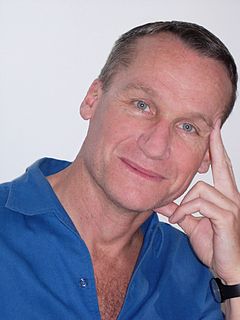A Quote by Samuel Johnson
A translator is to be like his author; it is not his business to excel him.
Related Quotes
There are three infallible ways of pleasing an author, and the three form a rising scale of compliment: 1, to tell him you have read one of his books; 2, to tell him you have read all of his books; 3, to ask him to let you read the manuscript of his forthcoming book. No. 1 admits you to his respect; No. 2 admits you to his admiration; No. 3 carries you clear into his heart.
The translator ... Peculiar outcast, ghost in the world of literature, recreating in another form something already created, creating and not creating, writing words that are his own and not his own, writing a work not original to him, composing with utmost pains and without recognition of his pains or the fact that the composition really is his own.
In a sense, the religious person must have no real views of his own and it is presumptuous of him, in fact, to have any. In regard to sex-love affairs, to marriage and family relations, to business, to politics, and to virtually everything else that is important in his life, he must try to discover what his god and his clergy would like him to do; and he must primarily do their bidding.
There's a story about when President Lyndon Johnson visited NASA and as he was walking the halls he came across a janitor who was cleaning up a storm, like the Energizer bunny with a mop in his hand. The president walked over to the janitor and told him he was the best janitor he has ever seen and the janitor replied, "Sir, I'm not just a janitor, I helped put a man on the moon." See, even though he was cleaning floors he had a bigger purpose and vision for his life. This is what kept him going and helped him excel in his job.
There is no obligation for the author of a film to believe in, or to sympathise with, the moral behaviour of his characters. Nor is he necessarily to be accredited with the same opinions as his characters. Nor is it necessary or obligatory for him to believe in the tenet of his construction - all of which is a disclaimer to the notion that the author of Drowning by Numbers believes that all men are weak, enfeebled, loutish, boorish and generally inadequate and incompetent as partners for women. But it's a thought.
I think Donald Trump is very uninterested in his business. In the past he would be talking up his business, but since the election, I've seen almost a laser-like focus on his job as president. What gets him lit up the most in any conversation is bringing jobs into these midwestern states that have suffered because of technology and trade policies.




































